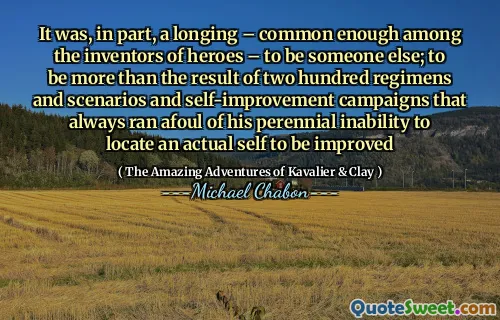
Nothing that had ever happened to him, not the shooting of Oyster, or the piteous muttering expiration of John Wesley Shannenhouse, or the death of his father, or internment of his mother and grandfather, not even the drowning of his beloved brother, had ever broken his heart quite as terribly as the realization, when he was halfway to the rimed zinc hatch of the German station, that he was hauling a corpse behind him
This passage from Michael Chabon's novel poignantly captures the profound emotional weight carried by the protagonist. The enumeration of tragic events—ranging from violence and death to internment—underscores the severity of his suffering, suggesting that these calamities, although deeply impactful, pale in comparison to the mental anguish of confronting a harrowing obligation: carrying a corpse. The imagery of being halfway to the hatch evokes a moment of revelation and despair, highlighting how the burden extends beyond physical circumstances and touches the core of human vulnerability. It prompts reflection on how grief and trauma often surpass tangible tragedies, revealing the complex layers of emotional resilience and the heaviness of moral and psychological burdens. This scene delves into the subtle yet immense toll that survival, responsibility, and loss impose on individuals, particularly in contexts of war or upheaval. The protagonist's journey literal and metaphorical underscores the idea that sometimes the most devastating burdens are the ones hidden beneath the surface—emotional weights that threaten to break even the strongest of spirits. It’s a stark reminder that human endurance has its limits and that the depth of despair can be found not just in the events themselves but in the process of confronting them. Chabon's portrayal encourages readers to grapple with themes of loss, duty, and the unpredictable nature of emotional resilience in the face of relentless hardship.









